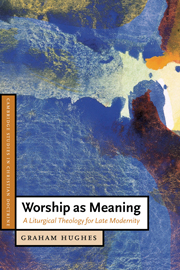Epilogue
Published online by Cambridge University Press: 03 March 2010
Summary
From this long peregrination I return to my subject entering a church unfamiliar to her, hoping and expecting that what transpires in the next hour or so will be a meaningful event. I said that the challenge she sets us is to offer an account of the meanings (meaningfulness) to which she aspires: what sort of meaning is this which we call a liturgical event? What would a theory of meaning look like which could guide or facilitate the achievement of this kind of meaning? Is it possible to give some sort of account of the ways in which such meanings are constructed and transmitted on the part of liturgical leaders and are appropriated by those who participate in a worship service (above, page)?
Since leaving her, we have seen that in late modernity we reckon meaning not to be some sort of monolithic abstraction, dependent on external sanction such as verification, truth condition, phenomenological constitution, structure, or deconstructive artifice. We think now it is more likely to be something ‘fastened together’ in a collaborative work between those who propose meanings and those who appropriate them and – to this extent – bring them to completion. Just in so far as this is a collaborative responsibility, we think it quite unlikely that there will be finally definitive meanings – some sort of God's-eye view of the world.
- Type
- Chapter
- Information
- Worship as MeaningA Liturgical Theology for Late Modernity, pp. 300 - 302Publisher: Cambridge University PressPrint publication year: 2003



